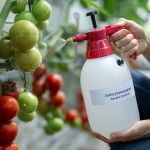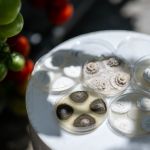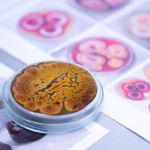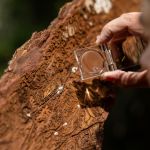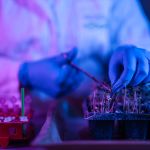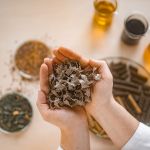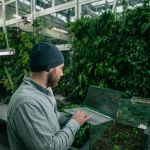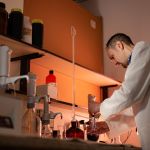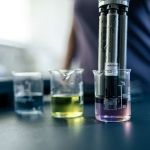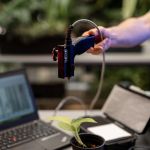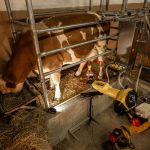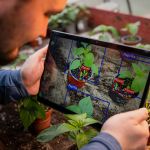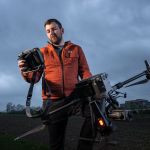Science and Research
Research topics
Creative research and development activities at the Faculty of Agriculture and Technology, University of South Bohemia (FAT USB) are centred around five principal topics in particular - sustainable agriculture, agricultural biotechnology, quality of agricultural products and food, agriculture and environment, agriculture and technology 4.0 – which are closely correlated with the current social demand in the field of agricultural research. These topics are of high societal relevance not only at the national but also at the international levels.
Research and development activities at the FAT USB are interlinked with cooperation not only with partner universities and research institutions, but also enjoy the traditional close links to the user sphere, which encompasses state administration authorities, public organizations, agricultural and processing enterprises, companies engaged in agricultural services and trade as well as other business entities.
Standard outputs take the form of scientific articles published in impact-factor specialized journals as well as results of an application character, such as patents, utility and industrial designs, applied methodologies, tried-and-tested technologies and other types of results.
Sustainable agriculture or permanent sustainable agriculture has long been one of the essential objectives of the Common Agricultural Policy of the EU. The concept consists in the adaptation of agricultural activities to the sustainable management of natural resources and respect for the environment. Accordingly, it is desirable in plant growing to lay emphasis on crop rotation, economical yet efficient tillage systems, good soil organic matter management and harmonious nutrient replenishment. An important role is played by efforts to expand the range of plants grown and to increase the species variability. In the area of plant protection against harmful factors, priority is given to the integrated approach and preventive measures in pursuance of reducing the quantity of pesticides used. Similar principles are applied by analogy to livestock breeding, where the efforts are directed towards a high level of performance, taking into account the genetic potential of the animals reared, using suitable breeding techniques and technologies, quality nutrition, health care and ensuring adequate animal welfare.
In the context of the thematic area “Sustainable agriculture”, scientific and research activities at the FAT USB are oriented mainly at the following areas:
- evaluation of the influence of genotype and other cultivation factors on yield parameters and quality of the achieved production of field crops and other crop plants
- evaluation of the influence of the technology and management of livestock breeding on the performance, production quality and health condition of animals
- application of plant biological protection in field and greenhouse conditions
- organic and social agriculture
- evaluation of energy and nutrient flows in agricultural production
- valorisation of waste and by-products from agricultural production
A modern, intensively developing discipline, biotechnology combines biology and biotechnology, thus offering enormous opportunities for new innovations. Biotechnology affects a wide range of human activities, including agriculture. Agricultural biotechnology, also known as “green” biotechnology, is based on biotechnological methods and techniques applied to agricultural processes. Biotechnology thus constitutes the application of modern scientific techniques and approaches, knowledge of genomics, transcriptomics, cell and molecular biology to plant cultivation and animal breeding. At the same time, biotechnology makes it possible to surpass the limits of conventional breeding procedures. This discipline also addresses the issue of genetic modification, modern molecular breeding techniques, such as marker-assisted selection and genomic selection. These methods and tools allow for breeding or cultivating of new efficient and resistant varieties, with the positive result in a form of a higher performance of agriculture and reduced pesticide consumption.
In the context of the thematic area “Agricultural biotechnologies and molecular biology”, scientific and research activities at the FAT USB primarily focus on the following sub-themes:
- molecular biology and cultivation of agriculturally important plants
- use of the method of associative transcriptomics and bioinformatics tools for identification of genes controlling important quality traits and resistance to abiotic and biotic stresses
- population genetics of alien and invasive species
- molecular markers in animal breeding
- molecular diagnostics of plant and animal pathogens
- development of molecular detection techniques for rapid and specific detection of pathogens
Protecting quality of food and health is one of the main objectives of the Common Agricultural Policy of the EU. The quality of agricultural products depends on many quality-based characteristics, be it chemical composition or nutritional, microbiological, hygienic or sensory properties. High quality constitutes a competitive advantage for producers and is a guarantee of unwavering customer interest.
Quality indicators of agricultural raw materials and foodstuffs are subject to a number of factors present not only in primary agricultural production, but also throughout the food chain, and the knowledge of these factors is crucial for maintaining the required quality.
In the scope of the thematic area “Quality of agricultural products and foodstuffs”, scientific and research activities at the FAT USB are centred around the following areas:
- composition of agricultural raw materials and foodstuffs and options of influencing them in a positive direction
- nutritionally and sensory relevant components in agricultural raw materials and foodstuffs
- use of non-traditional sources in the development of new products
- quality of plant and animal products subject to the processing technology
- safety of the food chain and consumer health protection
From time immemorial, agriculture is closely linked to the environment. On the one hand, agriculture is based on the exploitation of natural resources, and, on the other, agriculture relies on human activity that shapes the environment. The landscape as we know it today is primarily the result of agricultural activity. Through agricultural activities in the landscape, people affect almost all components of the environment - in many ways positively, but regrettably, a large part of agricultural activities has also a negative impact on the environment.
In the framework of the topic “Agriculture and environment”, scientific and research activities at the FAT USB are concerned with a whole spectrum of the impact of agricultural activities on the environment, whether positive or negative. These activities include, inter alia, the following:
- evaluation of the impact of farming on biodiversity, climate and the hydrological regime of the landscape, eutrophication of surface waters
- study of the impact of farming on soil quality, the development and reduction of soil erosion
- development of concepts, procedures and technologies with the aim of a more environmentally friendly use of nature through agricultural management and environmental protection
- development of precision agriculture and the use of its potential for a more effective application of natural resources in agriculture, for the reduction of environmental burdens and for the protection of the environment
- design and assessment of land improvements in support of the landscape functions
Agriculture and Technology 4.0 is a generic term referring to a concept that is based on the use of modern computing methods and electronics in the area of agriculture and related applied sciences. Thanks to the technological advancement, new “physical-cybernetic systems” can be generated as bearers of new opportunities for farmers. These systems will be employed, for example, in the monitoring of microclimatic conditions inside livestock stables, in control systems for vertical farming, in automated assessments of plant health and adequacy of their growth, in technical devices used for agricultural activities and many more. Importantly, new modern technologies have already reaped success and are now widely used in industry (indicated, by analogy, as Industry 4.0), and will intensively penetrate into the agricultural sector in the upcoming years.
In the scope of the topic “Agriculture and Technology 4.0”, scientific and research activities are directed towards the following in particular:
- research and development of smart technologies for cattle and pig breeding, based on advanced computing practices
- application of artificial intelligence elements in agricultural technologies
- use of drones and digital image analysis for process monitoring in plant production
- application of monitoring systems, using remote sensing and artificial intelligence method

